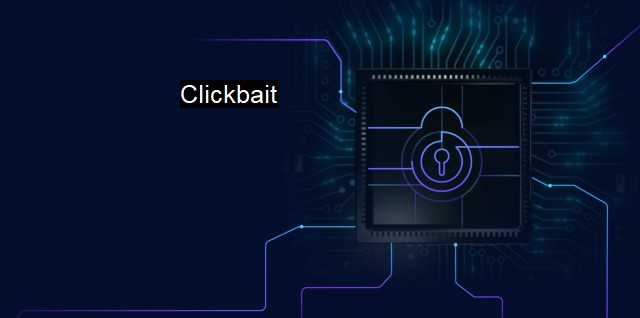What is Clickbait?
The Dangers of Clickbait and Fake News in Cybersecurity: How Sensational Headlines Could Lead to Data Breaches and System Vulnerabilities
Clickbait is a term derived from extensive internet jargon to broadly describe online content whose primary purpose is to attract user attention and encourage them to click on a particular web link. The motivation behind producing Clickbait content is primarily to drive online traffic and engagement to specific websites and, subsequently, increase advertising revenue. Despite its seemingly benign appearance and commonplace usage across multiple digital platforms, clickbait can pose a significant risk in the context of cybersecurity and antivirus protection.Often masked under a layer of sensational or misleading headlines, clickbait can direct users to unsecured and malicious websites. These websites could then, in turn, be a potential point of entry for various forms of cyber threats, including but not limited to, trojans, worms, ransomware, and spyware. They may also be packed with phishing scams and fake advertisements ready to prey on unsuspecting users.
In today's digitized information-driven society, one might arguably state that it is hard, if not impossible, to escape clickbait. An innocent click on a sensational headline can potentially lead to disastrous consequences such as data breaches, rogue software installations, identity theft and, at its worst, financial loss. Once the user clicks on the bait, they may unintentionally grant the malicious software permission to infiltrate their system, providing leeway to extract sensitive and valuable information.
Beyond luring users to illicit websites, clickbait also has the potential to exploit vulnerabilities in antivirus software. Through sophisticated and robust schema, cyber criminals can engineer clickbait to circumvent standard antivirus protocols and compromise the integrity of digital systems. For instance, a misleading headline laden with clickbait might prompt users to download programs or applications that appear legitimate but instead carry a malicious payload. As a regular user might not suspect such disguised cyber threats, the existing antivirus software can go unnoticed or even left neglected, making the impact versions severe.
What makes clickbait a formidable cybersecurity challenge is its power to manipulate human curiosity and impulsivity. By offering irresistible content – often laden with emotion or peculiarity – clickbait exploits the gap in cybersecurity that technology alone cannot bridge: human behaviour. It is the human yearning for the sensational, surprising, or unusual that enables clickbait to thrive and proliferate cyber threats.
Preventing breaches caused by clickbait involves a two-pronged approach that intertwines both human judgement and modern technology. Adequate cybersecurity measures right from home networks to large corporations can short circuit these potential attacks. Updated, active antivirus systems are effective at guarding security peripheries, detecting foreign threats. Equally important is the effort to emphasize cybersecurity hygiene across all levels: being vigilant about online content and maintaining a scepticism against too-good-to-be-true stories, offers and provocative narratives.
In sum, clickbait is not simply an annoying facet of online content, but a bonafide hazard in the digital age. Particularly in terms of cybersecurity and antivirus, awareness against over-enticing headlines could be the deciding factor between secure versus compromised, in control versus exploited. Whether we see a landscape filled with deceitful, misleading, and damaging material or a cleaner internet depends largely on our collective alertness towards clickbait. Prevention resides not just in state-of-the-art technology, but also in discerning online navigation by the user and their ability to resist such baits.

Clickbait FAQs
What is "clickbait" in the context of cybersecurity and antivirus?
In cybersecurity and antivirus, clickbait refers to online posts or ads that are designed to lure users into clicking on them by using sensational or misleading headlines. These headlines are crafted to grab the user's attention and make them curious, often with the intention of tricking them into downloading malware or giving up personal information.How can I avoid falling for clickbait in cybersecurity and antivirus?
To avoid falling for clickbait in cybersecurity and antivirus, it's important to be cautious about what you click on. Don't click on links or ads that promise amazing deals or make unrealistic claims. Always verify the source of the message or advertisement before clicking on it, and make sure it comes from a reputable company or website. Additionally, keep your antivirus software up to date to protect your computer from malware.What are some examples of clickbait in cybersecurity and antivirus?
Examples of clickbait in cybersecurity and antivirus include headlines like "You won't believe what this antivirus can do!" or "Get a free security scan and protect your computer NOW!" These headlines may sound enticing, but they often lead to fake or malicious websites that can harm your computer.Why is clickbait harmful in the context of cybersecurity and antivirus?
Clickbait is harmful in the context of cybersecurity and antivirus because it can trick users into downloading malware or giving up personal information. This can lead to a variety of problems, including identity theft, financial loss, and damage to your computer's operating system. Clickbait can also waste your time and resources by leading you to fake or useless products that don't actually provide the protection you need.| | A | | | B | | | C | | | D | | | E | | | F | | | G | | | H | | | I | | | J | | | K | | | L | | | M | |
| | N | | | O | | | P | | | Q | | | R | | | S | | | T | | | U | | | V | | | W | | | X | | | Y | | | Z | |
| | 1 | | | 2 | | | 3 | | | 4 | | | 7 | | | 8 | | |||||||